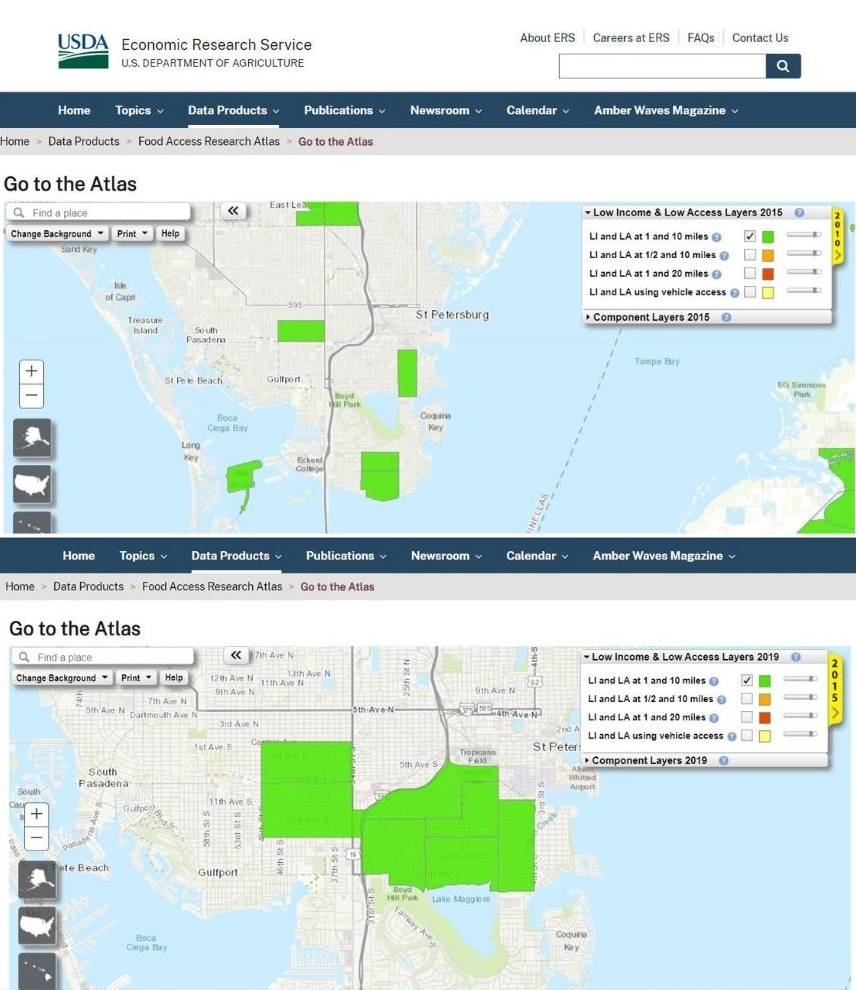
Author: Wendy Wesley
Data from the latest census show areas of USDA-designated “low income, low access,” or food deserts, have more than tripled in south St. Petersburg. This is evidenced by seven adjacent census tract areas in 2020 compared with two non-adjacent tracts in 2015.
This news comes as no surprise to food activists, like me, who work in local healthcare. We see the toll that nutrition insecurity takes on a community through worsening chronic diseases like heart failure and diabetes that are best managed when food is abundant, affordable, healthy and fresh.
Their devastating effects are exacerbated on gas station diets.
With this new data, and a community clamoring for interventions, we collectively scratch our heads and ask, “What’s taking so long?”
 When the Walmart at Tangerine Plaza closed in February of 2017, I anticipated the areas of “low income, low access” would increase. I did not expect those census tract areas to TRIPLE. This shows us the profound ripple effects of one grocery store to a community.
When the Walmart at Tangerine Plaza closed in February of 2017, I anticipated the areas of “low income, low access” would increase. I did not expect those census tract areas to TRIPLE. This shows us the profound ripple effects of one grocery store to a community.
The largest retail space of the city-owned Tangerine Plaza, once the site of full-service grocers Sweetbay and Walmart, has sat empty for more than four years.
Tangerine Plaza is located within the city’s South Community Redevelopment Area which was created to promote development in housing, neighborhoods and businesses. It comprises 7.4 square miles and is one of the largest in Florida. The plaza sits within a 42-block area of south St. Petersburg with no full-service grocery store.
The city reports that a developer with a grocery store tenant will occupy the space sometime this year or in early 2022. Alan Delisle, of the city’s economic development department, stated that a lease would be executed this past March.
Our elected officials have had four years to solve this problem. This is not four years with a stubborn property owner who will not budge, but four years of no movement on a property the city owns.
Pre-pandemic data shows that 12.5% of Pinellas households are food insecure, which creates a food budget shortfall of more than $73 million. Imagine what that data will show today.
Here are a few things our citizens, business leaders, elected officials and city staff can do to fix this:
* Reject aspirational change and virtue signaling from our elected officials in the forms of food policy councils and “food is a human right” proclamations that confuse doing something with doing the right thing.
* Demand our elected officials make good on their campaign promises to put a grocery store in Tangerine Plaza.
* Instead of focusing so intently on the rushed redevelopment of Tropicana Field, ask city leadership to pay attention to needy residents directly under its nose. Take the foot off the gas of the Tropicana Field redevelopment and dedicate some bandwidth to the residents of this city who are struggling with chronic disease.
* Support local and citizen-run farmers markets like the Southside Fresh Market and the Deuces Sidewalk Market.
* Hold our new mayor and city council members accountable in their support of the city’s Health in All Policies program. It should continue and be adequately funded especially where SNAP promotion and support of corner stores are concerned.
* Healthy St. Pete: focus on SNAP access promotion and health education to areas of “low income, low access.”
* Development Review Commission: consider health when making decisions and allow variances for community gardens.

Wendy Wesley is a licensed and registered clinical dietitian/nutritionist who works to improve the health of the community. She provides free public health education, individual nutrition counseling and advocacy for access to nutritious foods in her hometown of St. Petersburg.
Disclaimer: The views of the writers do not represent the views of the Florida Food Policy Council. We are a forum for the offering and sharing of information and encourage diversity and communication within the food system.